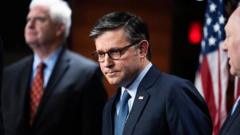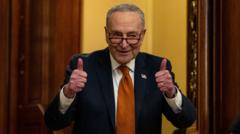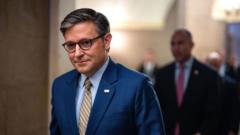**As the deadline approaches, Speaker Mike Johnson faces the challenge of garnering bipartisan support in a fractured political climate.**
**Government Shutdown Threatens as House Fails to Pass Trump-Backed Bill**

**Government Shutdown Threatens as House Fails to Pass Trump-Backed Bill**
**Congressional impasse intensifies with the clock ticking down to a potential shutdown amid partisan conflicts.**
The United States stands on the brink of a government shutdown, with less than 24 hours remaining for Congress to pass a funding measure. On the evening of Thursday, a revised spending proposal led by Republicans failed to secure a two-thirds majority in the House of Representatives, falling short due to the defection of 38 Republican members alongside solid Democratic opposition. The situation escalated following President-elect Donald Trump's intervention, which derailed an earlier bipartisan funding agreement, pressuring House Speaker Mike Johnson to draft an alternative that ultimately did not resonate with lawmakers.
The most recent challenge echoes back to September when attempts for a six-month spending extension met with resistance, primarily from Democrats, who opposed a controversial provision requiring citizenship proof for voters. This stalemate forced Congress to settle on a bare-bones spending bill, which would only suffice until December 20. However, Johnson's promise for a more straightforward bill was met with complexity when the new funding proposal ballooned to over 1,500 pages, included extensive emergency aid, and proposed a salary increase for lawmakers, prompting discontent among conservative factions of his party.
Elon Musk's active opposition to the spending plan—labeling it "criminal" and underscoring calls for cuts—significantly shifted the momentum against Johnson’s efforts. Trump's criticisms further complicated the negotiations, insisting on more stringent conditions while casting doubt on the proposed legislation's integrity. This backlash from high-profile figures within the Republican Party signals significant ideological fractures, complicating Johnson's role as Speaker amidst growing dissent among his ranks.
As the countdown to shutdown begins, Johnson faces immense pressure not only from Democrats, who refuse to compromise following broken agreements, but also from within his party. His attempt at streamlined legislation on Thursday resulted in further discontent, driving home the necessity of Democratic support for any future funding measures. Criticism from opponents, including pointed remarks from Democratic leaders ridiculing the influence of Musk over Republican actions, illustrates the deepening divide.
A government shutdown would halt many non-essential functions of federal agencies, impacting services like food safety inspections and operations in national parks while essential services such as medical care and law enforcement will continue albeit with staffing challenges. This impending shutdown threatens to have longer-lasting repercussions for Republicans, with doubts emerging about Johnson’s future leadership role amid volatile dynamics within the party.
With Republicans holding a slim majority, Johnson must navigate through these turbulent waters to secure funding while also managing the expectations of prominent party members and influential outside voices, raising questions about stability in leadership and party unity moving forward. As negotiations ramp up against the deadline, the stakes are high for all parties involved.
The most recent challenge echoes back to September when attempts for a six-month spending extension met with resistance, primarily from Democrats, who opposed a controversial provision requiring citizenship proof for voters. This stalemate forced Congress to settle on a bare-bones spending bill, which would only suffice until December 20. However, Johnson's promise for a more straightforward bill was met with complexity when the new funding proposal ballooned to over 1,500 pages, included extensive emergency aid, and proposed a salary increase for lawmakers, prompting discontent among conservative factions of his party.
Elon Musk's active opposition to the spending plan—labeling it "criminal" and underscoring calls for cuts—significantly shifted the momentum against Johnson’s efforts. Trump's criticisms further complicated the negotiations, insisting on more stringent conditions while casting doubt on the proposed legislation's integrity. This backlash from high-profile figures within the Republican Party signals significant ideological fractures, complicating Johnson's role as Speaker amidst growing dissent among his ranks.
As the countdown to shutdown begins, Johnson faces immense pressure not only from Democrats, who refuse to compromise following broken agreements, but also from within his party. His attempt at streamlined legislation on Thursday resulted in further discontent, driving home the necessity of Democratic support for any future funding measures. Criticism from opponents, including pointed remarks from Democratic leaders ridiculing the influence of Musk over Republican actions, illustrates the deepening divide.
A government shutdown would halt many non-essential functions of federal agencies, impacting services like food safety inspections and operations in national parks while essential services such as medical care and law enforcement will continue albeit with staffing challenges. This impending shutdown threatens to have longer-lasting repercussions for Republicans, with doubts emerging about Johnson’s future leadership role amid volatile dynamics within the party.
With Republicans holding a slim majority, Johnson must navigate through these turbulent waters to secure funding while also managing the expectations of prominent party members and influential outside voices, raising questions about stability in leadership and party unity moving forward. As negotiations ramp up against the deadline, the stakes are high for all parties involved.




















